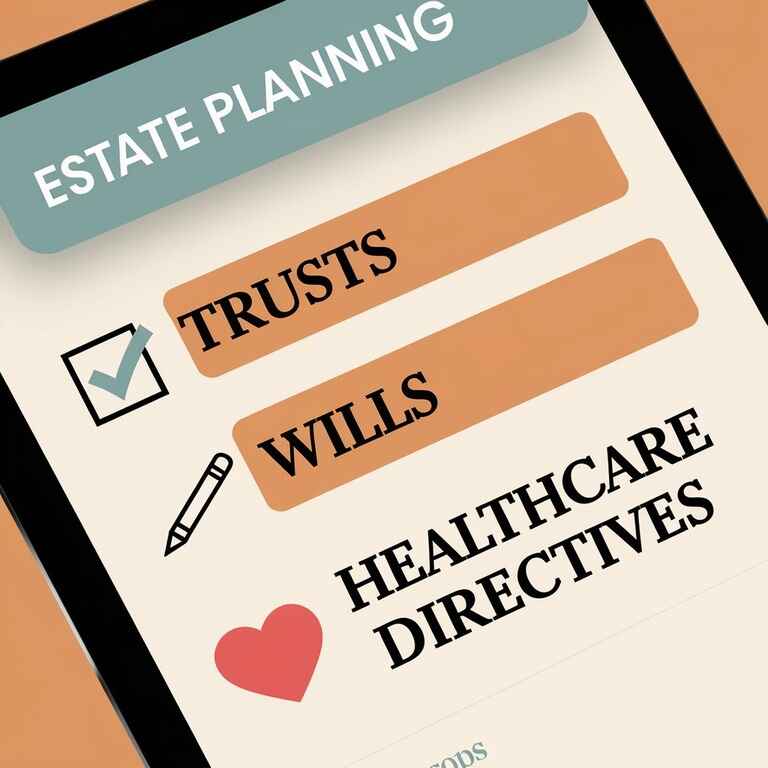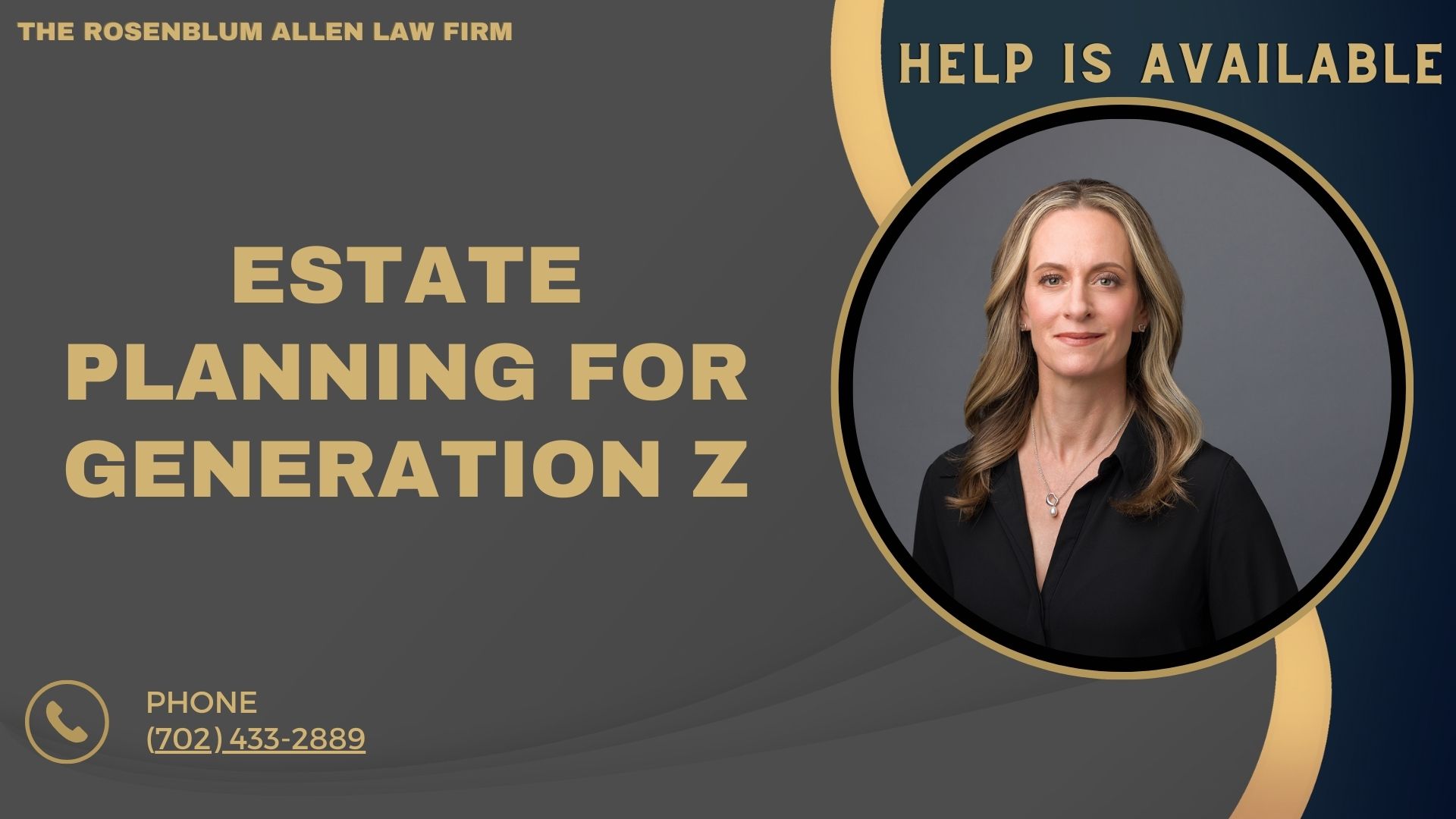Estate planning involves preparing the necessary legal documents and arrangements to manage your assets, healthcare decisions and wishes after your death or if you are incapacitated. It is commonly associated with older generations who have amassed significant wealth, but it is just as important for younger generations, including Generation Z (people born roughly between 1997 and 2012). Estate planning ensures that your assets are distributed according to your wishes, helps avoid costly legal processes like probate, and can provide peace of mind for your loved ones.
For Gen Z, estate planning is about more than just wealth—it’s about preparing for unexpected events and protecting your digital legacy, healthcare decisions, and financial future. Planning early ensures you don’t leave critical choices to chance, especially as you build your career and accumulate assets.
The Importance of Starting Early: Why Gen Z Should Care
Many young people may think estate planning is something they will handle later in life, but starting early can prevent complications. Establishing an estate plan ensures that you control your financial and medical decisions, even if something unexpected happens. For Gen Z, having a plan in place at an early age is crucial for:
- Financial Security: Managing your assets, including savings, investments, and even your student loans, in a way that aligns with your goals.
- Healthcare Decisions: Design someone to make healthcare decisions for you if you need help to make them yourself.
- Guardianship of Minor Children: If you have young children, ensure their well-being by naming a trusted guardian in case of an emergency.
Starting early allows you to take advantage of tax and estate planning strategies that will protect your assets and simplify the process if something happens to you.
Key Differences Between Estate Planning for Gen Z and Other Generations
While estate planning principles remain the same across all generations, the unique characteristics of Gen Z mean that their estate plans may look different compared to older generations. Some key differences include:
- Digital Assets: Gen Z is more likely to have significant digital assets—social media accounts, cryptocurrencies, digital files, and online businesses—that must be included in their estate plan.
- Student Debt: With many Gen Z individuals still in school or starting their careers, handling student loans and other debt in an estate plan is more pertinent for this generation.
- Early Asset Accumulation: While they may not have the same wealth as older generations, Gen Z may still need to consider retirement savings, investments, and other financial assets in their estate planning.
These factors make it essential for Gen Z to approach estate planning with specific considerations for their lifestyle and digital presence.

Essential Components of Estate Planning
Wills: The Foundation of Your Estate Plan
A will is one of the most essential components of any estate plan. It allows you to specify how your property should be distributed after your death and outline your final wishes regarding your burial or cremation. For Gen Z, a will may be relatively simple, especially if they still need to own significant assets, but having one in place is still essential.
What a Will Does and Why You Need One
- Distributes Property: Your will ensures that your belongings, including money, personal items, and real estate, go to the individuals or organizations you choose.
- Appoint an Executor: This person ensures your estate is handled according to your wishes. They’ll manage any debts, taxes, and other legal requirements.
- Designates Guardianship for Minor Children: If you have children, a will allows you to designate who will care for them if something happens to you and your partner.
Even if you’re starting to build your estate, having a will ensures your wishes are respected and can help avoid confusion or disputes among family members.
Common Mistakes in Writing a Will
While a will is crucial, many people make mistakes when drafting one. Here are some common errors to avoid:
- Failing to Update Your Will: As your life circumstances change, it’s essential to update your will to reflect any new relationships, assets, or wishes.
- Not Naming an Alternate Executor: If your primary executor is unavailable, having a backup executor ensures your wishes are still fulfilled.
- Overlooking Digital Assets: Many people forget to specify how they should manage their digital assets, from online bank accounts to social media profiles.
Having a clear, up-to-date, and comprehensive will is essential for ensuring the proper handling of your estate.
Trusts: Why They Might Be a Good Option
While a will is a great starting point, a trust can provide additional benefits, particularly for those who want to avoid probate or have more complex wishes. Trusts can be beneficial for Gen Z as they start to accumulate more assets.
Differences Between a Trust and a Will
- Avoiding Probate: A trust allows assets to pass directly to beneficiaries without going through the lengthy and costly probate process, which can be a significant advantage.
- Control Over Distribution: With a trust, you can control when and how your assets are distributed, such as setting up a trust that releases funds to beneficiaries at certain ages or under specific conditions.
Types of Trusts Gen Z Might Consider
- Revocable Living Trust: This type of trust allows you to change or revoke it at any time while alive. It can help manage assets during your lifetime and after death without probate.
- Irrevocable Trust: Once created, this type of trust cannot be changed or revoked. It may offer more protection from taxes and creditors.
Trusts are often seen as a more advanced estate planning tool, but they can be handy for individuals who want to plan for long-term wealth distribution.
Power of Attorney: Protecting Your Decisions
A power of attorney (POA) allows you to designate someone to decide on your behalf if you cannot do so due to illness or injury. This is an essential aspect of estate planning that many Gen Z individuals overlook, but it’s necessary for securing your interests in case of incapacity.
What Power of Attorney Means
A POA can be general or limited in scope. A general POA allows the agent to make a wide range of decisions on your behalf. At the same time, a limited POA restricts its authority to specific matters, such as financial decisions or healthcare-related issues.
How It Works and Why You Need It
- Health Care Decisions: A healthcare POA ensures that someone you trust can make medical decisions if you are unable to communicate your wishes.
- Financial Decisions: A financial POA allows someone to manage your finances, pay bills, and handle investments if you cannot.
Having a power of attorney helps ensure that your decisions are made according to your wishes, even if you cannot make them yourself.
Beneficiary Designations: Where Your Assets Go
Beneficiary designations are a critical part of estate planning, especially for Gen Z. These designations ensure that certain assets, such as life insurance policies, retirement accounts, and bank accounts, pass directly to the individuals or entities you choose, avoiding probate.
Importance of Keeping Beneficiaries Updated
- Life Changes: Marital status, children, and family dynamics can change over time, making it essential to update your beneficiary designations to reflect your current wishes.
- Legal Protections: Proper beneficiary designations ensure your assets go to the right people without legal complications.
What Happens Without Proper Designations?
If beneficiary designations are not kept current, assets may go to unintended recipients or become involved in a lengthy legal process. Keeping these designations updated is key to ensuring the effectiveness of your estate plan.
Digital Assets and Estate Planning
Managing Digital Assets in Estate Planning
Digital assets are becoming an increasingly important part of estate planning, especially for Generation Z. From your social media profiles to digital photos, cryptocurrencies, and online accounts, these digital assets need to be considered in your estate plan. If you don’t plan for them, your loved ones may not know how to manage or access them after you’re gone.
Defining Digital Assets and Their Importance
Digital assets are any assets stored online or in digital format. These include:
- Social Media Accounts: Facebook, Instagram, Twitter, etc.
- Digital Files: Photos, music, videos, and documents stored in the cloud or on devices.
- Cryptocurrency: Digital currencies such as Bitcoin, Ethereum, and others.
- Online Business Accounts: E-commerce sites, domain names, and online services.
- Email Accounts: Gmail, Yahoo, etc.
Why do digital assets matter? Because they can hold sentimental value (photos, messages) or financial value (cryptocurrency, online businesses). They also require specific instructions for access and management.
How to Include Digital Assets in Your Estate Plan
You should include your digital assets in your will or trust. Here’s how to do it:
- List All Digital Assets: List all your digital accounts and assets, including login information.
- Create Access Instructions: Include clear instructions on how to access these accounts, whether through passwords or other methods.
- Designate a Digital Executor: Consider naming someone responsible for handling your digital assets. This person should have the necessary access and knowledge to manage them.
- Protect Your Privacy: If you’re worried about privacy, consider using a password manager or encryption for sensitive information.
Estate planning for digital assets helps ensure your online presence and wealth are appropriately managed.
Social Media and Digital Life: Planning for the Unseen
Your digital life is vast and complex. Social media accounts, online banking, cloud storage, and even video game profiles need special consideration. Many social platforms, like Facebook, allow you to designate someone to manage your account after you pass.
Choosing an Executor for Your Digital Estate
Not all executors can manage your digital assets, so choosing someone with the right skills is essential. Here are some options:
- A Digital Executor: This person can manage your social media, email accounts, and other online services.
- A Trusted Friend or Family Member: Someone who understands your digital preferences and can act on your behalf.
Handling Online Accounts After Death
Different platforms have different policies for managing accounts after death. Here’s a brief look at how some popular services handle it:
| Service | What Happens to Account After Death |
|---|---|
| Can memorialize the account or delete it. You can appoint a legacy contact. | |
| Similar to Facebook, allows you to memorialize or delete the account. | |
| Allows you to set up an inactive account manager. | |
| Apple | You can nominate a person to access your data through your Apple ID. |
| Allows you to request account deactivation or deletion after death. |
By addressing your digital assets, you protect both your data and your online legacy.

Estate Planning for Young People: Unique Considerations
Why Gen Z Might Need Estate Planning Sooner Than You Think
You may be young, but you’re not invincible. Unexpected events can happen at any time, and it’s crucial to have a plan in place. Estate planning for young people, including Gen Z, is about more than just wealth—protecting your future.
The Benefits of Starting Early
- Peace of Mind: Knowing your assets and medical decisions are planned for can give you peace of mind, even if you’re young.
- Protection for Loved Ones: Your family and friends won’t have to make difficult decisions about your care or assets without guidance.
- Financial Control: Estate planning ensures that your debts, savings, and investments are appropriately managed if something happens to you.
It’s brilliant to put a plan in place while you’re young. It’s not about expecting the worst but preparing for the unexpected.
How Gen Z’s Financial Landscape Affects Estate Planning
Many Gen Z individuals are just starting their careers, so their estate planning might be more straightforward. However, even with limited assets, estate planning is essential to address:
- Student Loans: If you have student debt, you must address how it will be handled during your death.
- New Investments: Some Gen Z individuals are beginning to invest in stocks, real estate, or cryptocurrency. These assets should be planned for in your estate.
- Employment Benefits: You may have life insurance or retirement benefits through your employer that should be allocated appropriately in your estate plan.
It’s also common for Gen Z to have side businesses or online income streams, which should be carefully considered in your estate plan.
The Role of Family and Friends in Estate Planning
When it comes to estate planning, choosing the right people to be involved is just as important as creating the plan itself. These people are likely close family members or trusted friends of Gen Z.
Choosing the Right People to Handle Your Estate
- Executor: This person is responsible for ensuring your wishes are carried out. You’ll want someone accountable and organized.
- Healthcare Proxy: This person will make medical decisions if you can’t. Choose someone who knows your values and healthcare preferences.
- Guardian for Minor Children: If you have children, choose a trusted person to raise them in your absence.
Be sure to discuss your estate plan with these individuals. They must fulfill their roles and be willing to step up when the time comes.
The Emotional Impact on Loved Ones
While estate planning ensures your wishes are followed, protecting your loved ones from unnecessary stress is also about protecting them. Clear instructions in your estate plan can ease the emotional burden your family may experience during a difficult time.
Planning helps your family avoid difficult decisions during an already stressful period.
Technology and Tools for Estate Planning
Online Estate Planning Services: Pros and Cons
Advancements in technology have made estate planning more accessible, especially for younger generations. Online estate planning services allow you to quickly create a will or trust from the comfort of your home. However, they have limitations.
How Technology Makes Estate Planning Easier
- Convenience: You can create a basic estate plan online without visiting a lawyer’s office.
- Cost-Effective: Online services are typically more affordable than hiring an attorney.
- Quick Setup: Many online services offer easy-to-follow templates to guide you through the process.
Risks of Relying on DIY Online Estate Planning
While online estate planning is tempting, it may not always be the best option. Consider these risks:
- Legal Complexity: Online services may need to account for state-specific laws, which could lead to potential issues with the validity of your plan.
- Lack of Personalization: DIY plans may not address your unique situation or future needs.
In some cases, working with an estate planning attorney can ensure your plan is thorough and legally sound.
Using Apps and Software for Estate Management
Managing your estate continues beyond creating a will or trust. Now, apps and software are available to help you organize and update your estate plan. These tools can be handy for Gen Z, who are already familiar with technology.
Top Apps for Organizing Your Estate Plan
- Everplans: This app allows you to store essential documents and create a plan for your loved ones.
- Trust & Will: An easy-to-use app for creating wills and trusts tailored to your needs.
- Final Roadmap: A comprehensive estate management app that helps you track everything from wills to medical directives.
How Technology Enhances Long-Term Estate Planning
Using apps and software can help you stay organized and keep your estate plans up to date. You can easily update beneficiary designations, track asset changes, and store critical legal documents securely.
Technology offers the convenience of managing your estate with minimal stress and maximum control.


Trusts and Wills: The Basics for Generation Z
Understanding Wills: Why They Matter
A will is a legal document that outlines how your assets will be distributed after you pass away. Even if you’re young, having a will can save your loved ones from confusion and stress.
What Should Be in Your Will?
Here are some key things to include:
- Beneficiaries: These are the people who will inherit your assets.
- Assets: List the assets you want to pass on, whether money, property, or personal items.
- Executor: This person will be responsible for carrying out your wishes.
- Guardianship: If you have young children or dependents, a will allows you to designate a guardian.
Your will can also address what happens to digital assets and any special instructions for funeral arrangements.
Why Gen Z Should Have a Will
You may not have a lot of assets yet, but a will still provides clarity and peace of mind. It ensures that your possessions and assets are handled according to your wishes. Without a will, state laws will determine how your property is divided.
Trusts: A Smarter Way to Protect Your Assets
Trusts are another tool to consider when planning an estate. Unlike a will, which goes into effect after your death, a trust can also be used to manage your assets during your lifetime. Trusts can offer more control and protection over your assets.
What Is a Trust?
A trust is a legal arrangement where a trustee holds and manages assets on behalf of beneficiaries. There are several types of trusts, but here are the basics:
- Living Trust: Created while you’re alive, allowing you to manage assets during your lifetime and distribute them after your death.
- Testamentary Trust: Created through a will, activated after your death to manage your assets.
Benefits of a Trust for Gen Z
- Avoiding Probate: Probate is the legal process of distributing your estate. A trust can help your assets avoid probate, making the transfer quicker and more private.
- Asset Protection: A trust can protect your assets from creditors or lawsuits.
- Control: You can decide how and when your beneficiaries receive their inheritance, offering more flexibility than a will.
Trusts are powerful, especially if you have significant assets or want to ensure a smooth transfer.
Healthcare Directives and Power of Attorney
Healthcare Directives: Making Your Wishes Known
A healthcare directive (also known as a living will) is a document that outlines your medical preferences if you become unable to communicate them yourself. This is especially important for Gen Z, as you should ensure that your healthcare wishes are known during an accident or illness.
What Is Included in a Healthcare Directive?
- Medical Treatment Preferences: This includes your wishes regarding life support, resuscitation, or organ donation.
- End-of-Life Decisions: You can specify if you want to be kept alive artificially or prefer to have life-sustaining measures withheld.
Having a healthcare directive ensures that your loved ones aren’t left to guess what you would want in critical situations.
Power of Attorney: Who Makes Decisions for You?
A power of attorney (POA) is a legal document that designates someone to decide on your behalf if you cannot do so yourself. There are two main types of POA:
Durable Power of Attorney
This allows someone to manage your financial affairs if you become incapacitated. It can cover paying bills, managing investments, or handling real estate transactions.
Healthcare Power of Attorney
This document designates someone to make medical decisions if you cannot do so yourself.
Having a power of attorney in place ensures that someone you trust is making important decisions for you when you cannot.
Why Power of Attorney Is Essential for Gen Z
While it may seem like something only older adults need, a POA is crucial for anyone over 18. If you were in an accident or became suddenly ill, a POA would allow someone you trust to handle your affairs until you recover.

Life Insurance: A Safety Net for Your Loved Ones
Life Insurance: Why It’s Important
Life insurance helps protect your loved ones financially if something happens to you. While it’s easy to think life insurance is for older generations, it’s just as crucial for Gen Z, especially if you have dependents or debts.
Types of Life Insurance
- Term Life Insurance: This policy covers you for a set period, like 10 or 20 years. It’s typically more affordable and provides a death benefit to your beneficiaries.
- Whole Life Insurance: A permanent policy that covers your entire life, building cash value over time.
How Much Life Insurance Do You Need?
The amount of coverage you need depends on your situation. Here’s a simple way to think about it:
| Factor | Consideration |
|---|---|
| Dependents | If you have children or a spouse, you’ll need more coverage. |
| Debt | Make sure your policy covers any outstanding loans or debts you have. |
| Living Expenses | Consider your loved ones’ living expenses without you. |
| Funeral Costs | Estimate the cost of your funeral and include it in your policy. |
How Life Insurance Fits Into Estate Planning
Life insurance is crucial to your estate plan, especially if you want to ensure your loved ones are financially responsible. If you’re the primary breadwinner, life insurance can help replace lost income, pay off debts, and provide financial stability.
It’s also worth noting that life insurance can be used to pay estate taxes, helping your heirs avoid liquidating other assets.
Financial Planning and Budgeting for Estate Planning
Building a Strong Financial Foundation for Estate Planning
Good financial planning is the foundation of a solid estate plan. To build this foundation, managing your money wisely and ensuring you have enough saved for your future needs is essential.
Tips for Effective Financial Planning
- Start Saving Early: The sooner you start saving, the more time your money has to grow.
- Set Financial Goals: Ensure you have clear goals for your short- and long-term financial future.
- Manage Debt: Pay off high-interest debt first to avoid paying unnecessary interest.
- Invest Wisely: Consider investing in low-cost index funds, stocks, or bonds to build wealth over time.
Budgeting for Estate Planning Costs
Estate planning doesn’t have to be expensive, but it’s essential to budget for it. You may need to pay for legal fees, trust administration, or insurance premiums.
Estimated Costs for Common Estate Planning Tools
| Estate Planning Tool | Estimated Cost |
|---|---|
| Simple Will | $100–$500 (online service or lawyer) |
| Trust Creation | $1,000–$5,000 (depending on complexity) |
| Healthcare Directive | $50–$200 (online service or lawyer) |
| Power of Attorney | $100–$500 (depending on complexity) |
| Life Insurance | $20–$50+ per month (depending on coverage) |
By planning ahead and budgeting for estate planning costs, you ensure that your future is secure and that your loved ones are protected.

Tax Considerations in Estate Planning for Generation Z
Understanding Estate Taxes
Estate taxes are taxes on the transfer of assets after someone passes away. While many Gen Z individuals may not have to worry about estate taxes immediately, it’s something to consider as your assets grow.
When Do You Need to Worry About Estate Taxes?
The federal government only imposes estate taxes on estates above a specific value, which changes over time. 2024, the federal estate tax exemption will be $12.92 million per individual. You won’t have to pay estate taxes if your estate is valued below this.
However, some states impose their own estate or inheritance taxes. For example, the estate tax exemption can be much lower in states like New Jersey and Massachusetts.
Minimizing Estate Taxes
Here are a few ways to reduce estate taxes:
- Gifting: You can give away assets during your lifetime to reduce the size of your estate. In 2024, you can gift up to $17,000 per recipient per year without paying gift taxes.
- Trusts: Certain types of trusts, like irrevocable trusts, can help reduce the value of your estate by removing assets from it.
- Life Insurance: As mentioned earlier, life insurance can provide liquidity to your estate, helping you pay taxes without selling off other assets.
Inheritance Taxes: What Gen Z Needs to Know
Inheritance tax is different from estate tax. It’s a tax paid by the person who inherits assets, not the estate itself. Some states have inheritance taxes, and the rates depend on the value of the inheritance and the relationship between the deceased and the heir.
For instance:
| State | Inheritance Tax | Exemption Amount |
|---|---|---|
| New Jersey | Yes | $25,000 |
| Pennsylvania | Yes | $3,500 |
| Iowa | Yes | $25,000 |
If you’re in one of these states, it’s important to factor in inheritance taxes when planning your estate.
Choosing an Estate Planning Attorney
Why You Need a Lawyer
While creating simple estate planning documents independently is possible, working with an estate planning attorney is usually best. A lawyer can help you navigate complex legal issues and ensure your wishes are legally enforceable.
How an Estate Planning Attorney Can Help
- Legal Expertise: Estate laws can be complicated, and an attorney can ensure your documents meet legal requirements.
- Personalized Advice: An estate planning attorney can provide tailored advice based on your goals, like ensuring that your family is provided for or minimizing taxes.
- Drafting Documents: An attorney can create a will, trust, or power of attorney, ensuring everything is legally sound.
Finding the Right Estate Planning Attorney for You
When choosing an estate planning lawyer, here are a few things to look for:
- Experience: Find someone who specializes in estate planning and has experience dealing with clients in your situation.
- Transparency: A good lawyer will clearly explain their fees and the process, helping you understand precisely what you’re getting.
- Comfort Level: Since estate planning is personal, you want to work with someone with whom you feel comfortable discussing your financial and family matters.
How Much Does an Estate Planning Attorney Cost?
Estate planning fees can vary depending on where you live and the complexity of your plan. Generally, you can expect to pay:
| Service | Estimated Cost |
|---|---|
| Simple Will | $300–$1,000 |
| Living Trust | $1,500–$3,000 |
| Power of Attorney | $100–$500 |
| Healthcare Directive | $100–$300 |
While the cost may seem high, it’s worth investing in a professional to ensure that your plan is properly executed.

Digital Assets and Estate Planning
What Are Digital Assets?
Digital assets are anything that exists in digital form and holds value. As a Gen Z individual, you likely have many digital assets that should be considered in your estate plan. These can include:
- Cryptocurrency: Bitcoin, Ethereum, and other digital currencies.
- Social Media Accounts: Facebook, Instagram, Twitter, etc.
- Online Accounts: Email, cloud storage, and subscriptions to services like Netflix or Spotify.
- NFTs: Non-fungible tokens, unique digital assets stored on the blockchain.
How to Include Digital Assets in Your Estate Plan
To ensure your digital assets are handled properly, you should:
- Make a List: Keep track of all your digital assets, including login information, passwords, and access instructions.
- Designate a Digital Executor: This person will manage your digital assets after you pass away.
- Include Instructions in Your Will: Clearly outline how you want your digital assets handled.
Digital Asset Storage and Protection
Since many digital assets are stored online, make sure you take the following steps to protect them:
- Use Password Managers: These tools can store and encrypt your passwords, making it easier to manage your digital life.
- Create a Digital Vault: Some services allow you to store sensitive information securely online. These services often have built-in features for passing on digital assets.
Failing to plan for your digital assets can leave your loved ones struggling to access your accounts or handle your online affairs.
Reviewing and Updating Your Estate Plan
The Importance of Regularly Reviewing Your Estate Plan
Your estate plan is not a one-time task. Life changes and your estate plan should reflect these changes. You should review your plan regularly—at least every 3-5 years—and after significant life events such as:
- Marriage or Divorce: Changes in your marital status may affect beneficiaries, asset distribution, or guardianship.
- Birth of Children: You may need to update your will and designate guardians for your children.
- Changes in Financial Situation: Significant changes in income or asset values may require adjustments to your plan.
- Death of Beneficiaries or Executors: If someone listed in your will or trust passes away, you’ll need to make updates.
How to Update Your Estate Plan
Updating your estate plan involves reviewing and revising your documents. You might want to:
- Consult Your Lawyer: Reach out to your estate planning attorney to discuss any changes you want.
- Make Sure Your Documents Are Legally Valid: Any changes you make should be legally binding, so ensure they are signed and witnessed according to state law.
- Communicate Changes to Your Loved Ones: Let your family and beneficiaries know about any significant changes to your plan so there’s clarity later.
Regularly updating your estate plan ensures that it continues to meet your needs and protects your loved ones when the time comes.

Common Mistakes to Avoid in Estate Planning
Not Having an Estate Plan at All
One of the biggest mistakes people make is needing an estate plan. Many young people think estate planning is only for older people, but the truth is everyone over the age of 18 should have one. Without an estate plan, state laws will decide what happens to your assets, and it may not align with your wishes.
Why Gen Z Should Act Now
You might not have a vast estate, but you still have assets and loved ones to consider. Creating an estate plan now can ensure that your belongings go where you want them to and prevent future legal battles.
Failing to Update Your Estate Plan
Your life is constantly changing, and your estate plan should reflect that. Please update your estate plan after major life events to avoid confusion and disputes later.
Key Life Events That Require Updates
- Marriage or Divorce: If you get married or divorced, you must update beneficiaries and possibly guardianship provisions.
- Children: The birth of a child should prompt a review of your plan, especially guardianship and asset distribution.
- Acquiring Significant Assets: If you buy a house or accumulate valuable assets, your estate plan should reflect these changes.
- Death of Beneficiaries: If someone listed in your plan passes away, you must revise your documents.
Not Planning for Digital Assets
Neglecting digital assets can create a big mess in today’s digital world. You may have cryptocurrency, social media accounts, or digital photos that you want to pass on. If these are addressed in your estate plan, your loved ones can access them.
How to Avoid Digital Asset Issues
- List All Digital Assets: Include information on cryptocurrency wallets, social media accounts, email accounts, and any online services you use.
- Designate a Digital Executor: Assign someone to manage your digital assets after death.
- Set Up Access Instructions: Use password managers or document your login information securely.
Ignoring Tax Implications
Estate taxes and inheritance taxes can take a large chunk of your estate if not appropriately planned. Many people need to consider the potential tax burden their beneficiaries might face. Fortunately, there are ways to minimize these taxes through gifting, trusts, or life insurance.
Strategies to Minimize Tax Impacts
- Annual Gifting: You can gift up to $17,000 per person each year without incurring gift taxes, reducing the size of your estate.
- Setting up a trust can reduce the taxable value of your estate, avoiding taxes on assets that pass through it.
- Using Life Insurance: Life insurance can give your beneficiaries the funds to cover estate taxes.
Not Discussing Your Plan with Loved Ones
Many people avoid discussing their estate plan with family members, assuming it will be clear after they’re gone. However, this can cause confusion and conflict. It’s essential to have an open conversation about your wishes.
Why Communication Is Key
- Avoid Conflict: Discussing your estate plan can prevent misunderstandings and family disputes.
- Ensure Your Wishes Are Followed: Explaining your decisions to family members can ensure they understand and carry out your plan.
- Clarify Roles: Make sure your executor and trustees understand their responsibilities before you pass away.
Estate Planning Resources for Generation Z
Online Tools and Services
Many online tools can help you get started with estate planning. These services are often more affordable than hiring a lawyer and can provide a basic plan for young adults who don’t have complex estates.
Popular Online Estate Planning Services
- LegalZoom: Offers customizable wills, trusts, and other estate planning documents.
- Trust & Will: A simple and affordable way to create a will or trust online.
- Betterment: An online financial service that offers estate planning tools for handling digital assets.
These services are great for starting your estate plan, but you may still want to consult a lawyer if your situation becomes more complex.
Working with an Estate Planning Attorney
While online tools are helpful, some situations require an attorney’s expertise. If you have significant assets, dependents, or a complicated family situation, a professional can guide you through the process and ensure everything is legally sound.
When to Hire an Attorney
- If You Have Children: Guardianship is a critical issue for parents, and a lawyer can help you make these decisions.
- If You Have a Large Estate: If your estate includes a business, real estate, or other complex assets, you’ll want legal advice to ensure your plan is thorough.
- If You Want to Minimize Taxes: A lawyer can help you set up trusts or other strategies to reduce estate taxes.
Books and Guides for Estate Planning
Many books and resources are available that break down the estate planning process in simple terms. Here are a few you may find helpful:
- “Estate Planning for Dummies” by N. L. S. F. L.: An excellent resource for beginners.
- “The 8-Hour Estate Plan” by Rick M. M.: A quick, easy-to-read guide to setting up a basic estate plan.
- “The Bogleheads’ Guide to Retirement Planning”: Offers information on estate planning as part of broader retirement planning.
Reading books like these can help you understand the nuances of estate planning and give you confidence as you create your plan.

The Bottom Line: Why Estate Planning Matters for Gen Z
Estate planning may seem like something for older adults, but it’s crucial for everyone, regardless of age. Whether you’re just starting in life or building your career, an estate plan ensures that your wishes are respected and your loved ones are cared for.
By starting early, you can:
- Prevent confusion and conflict among family members.
- Ensure your digital and physical assets are protected.
- Minimize taxes and help your heirs keep more of your estate.
- Make sure your healthcare and financial decisions are handled according to your wishes.
An estate plan doesn’t have to be complicated, but it’s essential to securing your future and giving your loved ones peace of mind. Start today, and you’ll thank yourself in the future.
The Role of Life Insurance in Estate Planning for Gen Z
Why Life Insurance Matters for Gen Z
Life insurance is often seen as something for older adults, but it can be a valuable part of your estate plan, even if you’re young. It’s not just about providing for your family after you’re gone—it can also help you manage estate taxes, protect assets, and secure your financial future.
Types of Life Insurance to Consider
- Term Life Insurance: Provides coverage for a set period, like 10, 20, or 30 years. It’s often more affordable, making it a good choice for younger individuals.
- Whole Life Insurance: Offers lifetime coverage with a cash value component. This type of insurance can be more expensive but accumulates value over time.
- Universal Life Insurance: A flexible option that combines lifetime coverage with an investment component. It allows you to adjust premiums and death benefits.
Using Life Insurance to Cover Estate Taxes
As we mentioned earlier, estate taxes can eat into your assets. If your estate is large enough to trigger estate taxes, life insurance can provide the liquidity necessary to pay those taxes without having to sell assets.
For example:
| Estate Value | Estate Tax | Life Insurance Payout |
|---|---|---|
| $10 million | $3 million | $3 million |
| $12 million | $4 million | $4 million |
In this scenario, life insurance can provide the needed funds to pay the taxes, leaving your assets intact.
How Life Insurance Protects Loved Ones
If you have dependents or other family members who rely on you financially, life insurance can ensure they’re taken care of if something happens to you. The death benefit can cover the following:
- Daily living expenses: Rent, bills, groceries, and more.
- Educational expenses: College tuition for your children.
- Debt repayment: Paying off personal loans, credit card debt, or mortgages.
By incorporating life insurance into your estate plan, you can ensure your loved ones don’t face financial hardship after your death.

The Importance of Healthcare Directives
What is a Healthcare Directive?
A healthcare directive is a legal document that outlines your medical wishes if you cannot communicate them yourself. It’s an essential part of an estate plan because it ensures that healthcare providers and your family know how to proceed with your treatment if you’re incapacitated.
Key Components of a Healthcare Directive
- Living Will: States your preferences about life-sustaining treatments, like ventilators or feeding tubes.
- Medical Power of Attorney: Appoints someone to make medical decisions for you if you cannot do so.
- DNR Order: “Do Not Resuscitate” orders specify that you don’t want life-saving measures in certain situations.
Why Gen Z Needs a Healthcare Directive
While you may not expect to face a medical crisis, accidents, and unexpected illnesses happen to people of all ages. A healthcare directive ensures your wishes are followed, giving your loved ones clarity during a difficult time.
How to Create a Healthcare Directive
- Consult an Attorney: The rules for creating a healthcare directive may vary by state, so it’s a good idea to work with an attorney to ensure your document is legally valid.
- Select Your Agent: Choose someone you trust to make medical decisions on your behalf. This person should be someone who understands your values and healthcare preferences.
- Review Regularly: Like other estate planning documents, your healthcare directive should be reviewed regularly, especially after major life changes.
A healthcare directive can relieve your family of the burden of making tough decisions during stressful times.
Trusts: Why They Matter in Estate Planning
What is a Trust?
A trust is a legal entity that holds and manages assets for the benefit of someone else. You transfer ownership of assets to the trust, and the trustee manages those assets according to your instructions. Trusts are often used to avoid probate, minimize taxes, and provide for beneficiaries in a controlled way.
Types of Trusts to Consider
- Revocable Living trusts allow you to make changes while you’re alive, and assets in the trust avoid probate after your death.
- Irrevocable Trust: Once assets are transferred to this type of trust, they can’t be changed. It can offer tax benefits and creditor protection.
- Testamentary Trust: Created through your will and goes into effect after your death. It can be used to manage how assets are distributed over time.
Why Gen Z Should Consider a Trust
Trusts can be a powerful tool in estate planning, even if you don’t have significant assets. Here’s why:
- Avoid Probate: Assets in a trust are not subject to the lengthy and expensive probate process, which can tie up your estate for months or even years.
- Control Over Distribution: You can set up a trust to control when and how your beneficiaries receive their inheritance. For example, you could give them funds in installments rather than a lump sum to prevent them from squandering it.
- Asset Protection: An irrevocable trust can protect your assets from creditors or lawsuits.
How to Set Up a Trust
Setting up a trust can be complex, so working with an estate planning attorney is best to ensure everything is done correctly.
- Choose Your Trustee: The person or institution responsible for managing the trust. You can be your trustee with a revocable trust, but you’ll need someone else for an irrevocable trust.
- Decide on the Beneficiaries: Choose who will benefit from the trust, whether family, friends, or charitable organizations.
- Transfer Assets to the Trust: You’ll need to legally transfer ownership of your assets to the trust, which may involve re-titling property or changing account beneficiaries.
By including a trust in your estate plan, you can ensure that your wishes are carried out as you intend, without the complications of probate or the risk of inheritance disputes.

How to Start Estate Planning as a Gen Z Individual
Take the First Step: Get Educated
Estate planning can seem overwhelming, but the first step is to get informed. Read articles, watch videos, or talk to professionals about the basics of estate planning. The more you know, the easier it will be to get started.
Create a Simple Will
Your will doesn’t have to be complicated. Starting with a simple will is a great way to begin your estate planning journey. It will help you outline your wishes for your assets, designate guardians for your children, and name your executor.
Consider Your Financial Situation
Even if you don’t have significant assets now, think about what you’ll have in the future. Will you have student loans, a house, or other vital assets? Start planning how you’d like these things handled, even if it’s just a rough outline.
Work with a Professional
While DIY tools can help, working with an estate planning attorney is often the best way to ensure your plan is comprehensive and legally sound. An attorney can help you create a will, trust, and other necessary documents tailored to your needs.
Starting early with estate planning can provide peace of mind and ensure your wishes are respected, no matter what the future holds.
Digital Assets and Estate Planning for Gen Z
What Are Digital Assets?
Digital assets are online accounts, files, and virtual properties that you may own. These include social media profiles, emails, cryptocurrencies, digital photos, and even websites. In today’s world, digital assets have become a significant part of our lives and should be part of your estate planning.
Examples of Digital Assets
- Cryptocurrency: Bitcoin, Ethereum, and other digital currencies.
- Social Media Accounts: Facebook, Instagram, Twitter, LinkedIn, etc.
- Email Accounts: Gmail, Yahoo, Outlook, etc.
- Cloud Storage: Photos, documents, and videos are stored on platforms like Google Drive or Dropbox.
- Domain Names and Websites: If you own a personal or business website, it’s a valuable asset.
- Digital Content: Music, e-books, and other purchased content.
Why Digital Assets Matter in Estate Planning
Many people only realize the importance of their digital assets once it’s too late. But if you pass away and have yet to make plans for your digital properties, they could become lost or inaccessible. Estate planning helps you ensure that your digital footprint is handled correctly.
Protecting Your Digital Legacy
If you want your loved ones to have access to your digital assets after you pass away, you need to make a plan for them. This includes making sure they can access and manage your online accounts, files, and content without facing legal barriers.
How to Include Digital Assets in Your Estate Plan
There are several steps to ensure your digital assets are properly handled after death.
- Make a List of Digital Assets: Write down everything—email accounts, social media profiles, online banking, and digital subscriptions.
- Create a Digital Will: You can add specific instructions for what should happen to your digital assets, like transferring or deleting accounts. Many online platforms allow you to designate a legacy contact or set up account settings after death.
- Store Login Information Securely: Keep your passwords and account information secure, such as in a password manager or a locked physical location. Avoid leaving them scattered in unprotected places.
- Choose a Digital Executor: Just as you appoint an executor for your physical estate, you should appoint someone to manage your digital assets. This person can be responsible for ensuring that your wishes are carried out.
By taking these steps, you can ensure that your digital life is preserved and managed according to your preferences.

Planning for Dependents and Guardianship
Who Needs to Plan for Dependents?
Guardianship is a crucial part of your estate plan if you have children, dependents, or anyone who relies on you for care. Whether you are a single parent, in a partnership, or want to plan for the future, deciding who will care for your dependents is essential.
Why It’s Important
If you pass away without naming a guardian for your children or dependents, a court will decide who cares for them. By clarifying your choice, you ensure that your loved ones are in good hands and that your wishes are followed.
Choosing a Guardian for Minor Children
Selecting a guardian for your children is one of the most critical decisions in your estate plan. This person will be responsible for raising your child if you can no longer do so.
Factors to Consider When Choosing a Guardian
- Values and Parenting Style: Make sure the guardian shares your values and will raise your child in a way that aligns with your beliefs.
- Location: Choose someone near your child’s home or school to make transitions easier.
- Health and Age: Ensure the person you choose can care for your children physically and mentally.
- Financial Stability: While not a requirement, it’s helpful to consider a guardian who can provide economic stability.
Once you choose a guardian, discuss your decision with them to ensure they’re willing and able to take on this responsibility.
Planning for Financial Support
If you have dependents, set up a trust or another mechanism to ensure that they are financially supported in the future. This can help cover their education, medical needs, and other expenses.
- Set up a trust: A trust can provide funds for your dependents and be managed by a trustee according to your wishes.
- Life Insurance: Life insurance can help cover your dependents’ living costs, ensuring they’re taken care of after your death.
What Happens if You Don’t Name a Guardian?
If you don’t make arrangements, a court will appoint a guardian for your children or dependents. This may result in a situation that you wouldn’t have chosen. It can also lead to family conflict or legal battles that delay providing care for your loved ones.
Having a plan for your dependents is vital to ensuring their emotional and financial well-being.
Estate Planning for Digital Nomads and Remote Workers
What is a Digital Nomad?
A digital nomad works remotely while traveling or living in different locations, often outside their home country. With technology, many people in Generation Z are choosing this lifestyle, meaning their estate planning needs are slightly different from someone who stays in one location.
Why Digital Nomads Need Estate Planning
Digital nomads face unique challenges when it comes to estate planning. They might not have a permanent address, own property abroad, or deal with different legal systems, which makes estate planning more complex.
Steps for Digital Nomads to Take in Estate Planning
- Review International Laws: If you own property in another country or travel frequently, consider the estate laws of those countries. Some countries have different inheritance laws, which can impact your estate.
- Designate a Trusted Agent: Choose someone trustworthy who can handle your affairs in case of an emergency while you’re abroad.
- Ensure Digital Asset Access: As digital nomads often rely on their devices for work, it’s crucial to make sure your digital assets (such as online banking accounts, passwords, and digital files) are accessible to those you trust.
- Update Your Estate Plan Regularly: As a digital nomad, your situation will change frequently—whether you acquire new assets or change locations. Regularly updating your estate plan will ensure that it’s always current.
Why Remote Workers Need Estate Planning
Even if you’re not a digital nomad, remote workers face similar challenges in estate planning. Working remotely often means you’re disconnected from a central office, and you may need an employer to help guide you through the benefits or legalities of estate planning.
Steps for Remote Workers to Consider
- Review Health Insurance and Benefits: Ensure that your health and life insurance benefits are adequate for you and your family if something happens.
- Ensure Estate Documents Are Accessible: You may work from different locations as a remote worker. Ensure your estate planning documents are easy to access and share with those who need them, such as a spouse or close family member.
Whether you’re a digital nomad or a remote worker, addressing estate planning will help protect your future and ensure your loved ones are provided for, no matter where you are.

Choosing the Right Estate Planning Tools for Gen Z
Wills vs. Trusts: What’s the Difference?
Regarding estate planning, the two most common tools are wills and trusts. Both can help you distribute your assets, but they work differently. Understanding which one is right for you is crucial.
Wills
A will is a legal document stating how you want your assets distributed after death. It’s one of the most straightforward tools.
- Pros:
- Simple to create.
- Allows you to name guardians for dependents.
- Specifies how to distribute assets.
- Cons:
- It goes through probate, which can be time-consuming and costly.
- Does not protect assets from creditors.
Trusts
A trust is a more complex tool where a trustee manages your assets to benefit your beneficiaries. There are several types of trusts, but the most common for estate planning are revocable living trusts and irrevocable trusts.
- Pros:
- Avoids probate.
- Protects assets from creditors.
- You can manage assets during your lifetime or after death.
- Cons:
- It is more complex and expensive to set up.
- Requires ongoing management.
Which One Should You Choose?
If your estate is simple and you want to distribute assets and name a guardian for your children, a will might be enough. However, a trust could be the better choice if you want to avoid probate and ensure your assets are managed efficiently.
Other Important Estate Planning Documents
Several other important documents, in addition to a will or trust, can help manage your estate and ensure your wishes are followed.
Power of Attorney
A power of attorney is a document that gives someone else the authority to make decisions on your behalf if you become incapacitated.
- Durable Power of Attorney: This type of power of attorney remains in effect even if you become mentally incapacitated.
- Healthcare Power of Attorney: This grants someone the authority to make medical decisions on your behalf if you cannot do so.
Living Will
A living will allows you to express your wishes about medical treatments if you are seriously ill and unable to communicate.
- End-of-Life Decisions: It helps to communicate your wishes about life support or resuscitation efforts.
- Medical Preferences: You can specify whether you want to be kept on life support or allowed to pass naturally.
Beneficiary Designations
Certain assets, such as life insurance policies, retirement accounts, and bank accounts, allow you to name a beneficiary who will inherit the asset directly. Make sure to update these designations to reflect your wishes regularly.
Common Estate Planning Mistakes for Gen Z to Avoid
Not Updating Your Estate Plan Regularly
Estate planning is more than a one-time task. As your life changes, so should your estate plan. Whether you get married, have children, buy a house, or experience other major life events, your estate plan needs to be updated.
Key Life Events That Trigger an Update
- Marriage or divorce.
- Birth of children or grandchildren.
- Significant financial changes, such as buying a home or inheriting money.
- Change in health status.
- Death of a beneficiary or executor.
Review your estate plan every few years or after a significant life event.
Not Naming an Executor
An executor ensures that your estate is administered according to your wishes. If you don’t name an executor, a court will appoint one for you, which could lead to delays and complications.
Choosing the Right Executor
- Pick someone trustworthy and organized.
- Make sure they are willing to take on the responsibility.
- Choose someone who understands your wishes and is familiar with your estate.
Forgetting Digital Assets
As discussed earlier, your digital assets are essential to your estate plan. Ignoring them can cause unnecessary stress for your loved ones after your death.
How to Manage Digital Assets
- Make a list of your online accounts, including passwords and login details.
- Set up digital asset management services or password managers.
- Designate a trusted person to manage your digital assets.
Not Having a Plan for Debts
Many people need to consider the debts they leave behind to distribute assets. If you have significant debts, plan for how they’ll be settled after your death.
How to Address Debts in Estate Planning
- List all your debts, including student loans, credit card debt, and mortgages.
- Make sure your assets are enough to cover your debts or consider life insurance.
- Consider setting up a trust to pay debts before your beneficiaries inherit anything.

Working with an Estate Planning Attorney
Why You Need an Estate Planning Attorney
Estate planning is more than just filling out forms. It involves complex legal considerations that vary depending on your unique situation. An estate planning attorney can help guide you through the process, ensuring that your documents are legally sound and your wishes are followed.
Benefits of Working with an Attorney
- Expertise in creating customized estate plans.
- Help with understanding tax implications.
- Assistance in ensuring that your documents meet legal requirements.
- Guidance on how to protect assets and minimize estate taxes.
What to Expect When Working with an Estate Planning Attorney
- Consultation: The attorney will discuss your needs and goals for your estate plan.
- Document Creation: The attorney will draft your will, trust, and other necessary documents.
- Review and Update: An attorney can help you review and update your estate plan regularly to ensure it reflects changes in your life.
While hiring an attorney involves some cost, the peace of mind it brings is invaluable. Estate planning is an investment in your and your family’s future, and an attorney can help you get it right.

Breaking It All Down
Estate planning is for older people and those with large estates. For Generation Z, it’s about taking control of your financial future, protecting your digital legacy, and ensuring that your loved ones are cared for no matter what happens.
By starting early and working with the right professionals, you can create an estate plan that reflects your wishes and gives you peace of mind. Whether you have assets or dependents or just want to ensure the preservation of your digital life, estate planning is a crucial step that will benefit you and your loved ones for years to come.

Frequently Asked Questions
Why is estate planning important for Gen Z?
Estate planning is essential for Generation Z because it helps ensure your assets, digital life, and loved ones are cared for if something unexpected happens. While you may feel like estate planning is something for later in life, starting early can help avoid confusion and legal battles, especially if you have dependents, significant digital assets, or major financial obligations.
What happens if I don't have an estate plan in place?
If you don’t have an estate plan, the state will determine how your assets are distributed, which may not align with your wishes. Your loved ones could face unnecessary delays, higher costs, and potential conflict over who will care for any dependents. A court may also decide who manages your estate and can even appoint someone to care for your children, who might not be your chosen person.
Do I need an estate plan if I don't have a lot of assets?
Even if you don’t have significant assets, an estate plan is still essential. It can protect your digital assets, ensure the care of your dependents (such as pets or minor children), and give you control over your medical and financial decisions if you become incapacitated. Estate planning is more than just asset distribution—it also addresses your wishes for health care and managing your affairs.
Can I update my estate plan if my life situation changes?
You should update your estate plan regularly to reflect significant life changes. This could include getting married, having children, moving to a new state, or acquiring new assets. Reviewing your estate plan after any significant life event is essential to ensure it still reflects your current situation and desires.
How do I keep track of my digital assets for my estate plan?
To keep track of your digital assets, make a comprehensive list of all online accounts you own, including social media accounts, email addresses, cloud storage, and cryptocurrency wallets. Store this information securely, such as in a password manager or a physical document kept in a safe location. Designating a trusted person to manage your digital assets after your death can also help ensure everything is handled according to your wishes.
What is the difference between a will and a living trust?
A will is a legal document that dictates how your assets will be distributed after death. In contrast, a living trust is a legal arrangement where a trustee manages your assets for your benefit during your lifetime and for the benefit of your beneficiaries after your death. A living trust can help avoid probate, whereas a will generally has to go through probate court, which can be lengthy and expensive.
Can I create an estate plan without a lawyer?
While it is possible to create a basic estate plan without a lawyer, consulting with an estate planning attorney is highly recommended to ensure everything is done correctly. Estate laws are complex and can vary depending on where you live, so working with a professional can help avoid costly mistakes and ensure that your plan is legally sound.
What should I include in my power of attorney?
A power of attorney gives someone the legal authority to act on your behalf if you become incapacitated. There are two main types of power of attorney: financial matters and healthcare decisions. You should select a trusted individual who understands your wishes and is willing to take on this responsibility. Make sure to outline clearly the powers you wish to grant them.
Should I have life insurance as part of my estate plan?
Life insurance is essential in estate planning, especially if you have dependents or significant debts. It can provide financial support for your loved ones after you pass away, ensuring funeral costs or outstanding bills do not burden them. Life insurance can also help cover estate taxes or ensure your assets are distributed according to your wishes.
How do I choose a digital executor?
A digital executor manages and distributes your digital assets after you pass away. When selecting a digital executor, choose someone tech-savvy and trustworthy. Discuss your wishes with them beforehand so they understand their responsibilities and ensure they know how to access your digital accounts securely.
Is estate planning necessary if I don't have children?
Even if you don’t have children, estate planning is still essential. You’ll want to ensure your assets are distributed according to your wishes, and having an estate plan in place can help your loved ones avoid complications after your death. You may also want to designate a healthcare proxy or power of attorney to handle your medical or financial decisions if you become incapacitated.
How often should I update my estate plan?
It’s a good idea to review and update your estate plan at least every three to five years or after significant life events such as marriage, divorce, the birth of a child, a move to another state, or substantial changes to your financial situation. Regular updates ensure that your estate plan reflects your current wishes and circumstances.
What are the tax implications of an estate plan for Gen Z?
Your estate plan’s tax implications depend on your estate size, the assets you hold, and where you live. Usually, younger individuals don’t have to worry about estate taxes. However, planning for the future is still essential, especially if you have significant assets like real estate, investments, or business ownership. Consulting an estate planning attorney or tax professional can help ensure that your estate plan minimizes tax liabilities for your heirs.
How do I ensure my pets are cared for after passing away?
If you have pets, you can include provisions for their care in your estate plan. You can name a pet guardian in your will and set aside funds to cover their care, food, and medical needs. Also, a pet trust should be established to ensure the funds are used specifically for their well-being.
Can I change my will after it is created?
Yes, you can change your will anytime, as long as you are mentally competent. To make changes, you must either create a new will or make a codicil (an amendment to the existing will). Follow the proper legal procedures to ensure the changes are valid.
What happens to my online accounts and subscriptions after I die?
If you don’t have a plan for your online accounts, your loved ones may struggle to access or close them. Many digital platforms, such as social media and email providers, allow you to designate a legacy contact or to set your account to be deleted after a period of inactivity. Make sure to include your online account details in your estate plan so your digital life can be managed according to your wishes.

Additional Resources for You from The Rosenblum Allen Law Firm.
For more in-depth guidance on estate planning for blended families and related topics, check out these helpful links:
Las Vegas Estate Planning Attorney
Learn how an experienced estate planning attorney in Las Vegas can help you create a customized plan to protect your family and assets.
Las Vegas Trust Attorney
Discover how trusts can be a powerful tool for asset protection and inheritance planning, especially for blended families.
Tips on Estate Planning
Get practical tips and actionable advice to make estate planning smoother and more effective for your unique family dynamics.
Estate Planning Checklist
This step-by-step checklist ensures you cover all essential elements of your estate plan, from wills to trusts and beneficiary updates.
Making a Will
Understand the importance of a legally valid will and how it can secure your family’s future, avoiding confusion and disputes.
Estate Planning Services
Explore comprehensive estate planning services to protect your assets, minimize taxes, and ensure your wishes are carried out.
Estate Planning Mistakes
Avoid common pitfalls in estate planning that can lead to unintended consequences, delays, and financial hardship for your family.
Estate Planning Probate
Learn how to navigate probate effectively and discover ways to minimize its impact through proper estate planning.
Las Vegas Asset Protection Attorney
Find strategies to shield your hard-earned assets from creditors, lawsuits, and other risks with the help of an asset protection attorney.
These resources will help you make informed decisions about your estate plan and provide the tools you need to protect your family’s future. Don’t hesitate to explore them to get the clarity and guidance you deserve.

Offsite Resources for You
American Bar Association (ABA) – https://www.americanbar.org The ABA provides valuable resources on estate planning, including legal guides and tips for finding a qualified estate planning attorney.
National Association of Estate Planners & Councils (NAEPC) – https://www.naepc.org This site offers tools, education, and professional development for those interested in estate planning and fiduciary services.
Estate Planning Council – https://www.estateplanningcouncil.org The Estate Planning Council connects professionals in the estate planning field and provides a directory to help find an expert.
The National Guardianship Association (NGA)—https://www.guardianship.org This website is an excellent resource for understanding the role of guardians and provides guides on finding a guardian for minors or incapacitated adults.
AARP – Estate Planning – https://www.aarp.org/estate-planning AARP’s website offers comprehensive guides, articles, and tools for managing estate planning, especially for those approaching retirement age.
The Balance – Estate Planning – https://www.thebalance.com/estate-planning-4074026 The Balance provides clear and concise articles covering all aspects of estate planning, from wills to trusts to digital asset management.
Trusts & Estates Magazine – https://www.wealthmanagement.com/trusts-estates This magazine offers in-depth articles, resources, and news related to trusts, estates, and wealth management. It’s an excellent resource for those seeking up-to-date information on estate planning topics.

A Special Message from Our Lead Attorney, Molly Rosenblum Allen, Esq

Thank you for taking the time to read through our resources on estate planning. I hope you found the information helpful as you consider your options. If you’re ready to secure your future, please call me and my team at (702) 433-2889. We’re here to assist you with your estate planning needs and guide you through the process. Let’s get the ball rolling on your situation today.
Warm regards,
Molly Rosenblum Allen, Esq.
The Rosenblum Allen Law Firm





